Let the fruits of education reform and development benefit all the people more fairly.
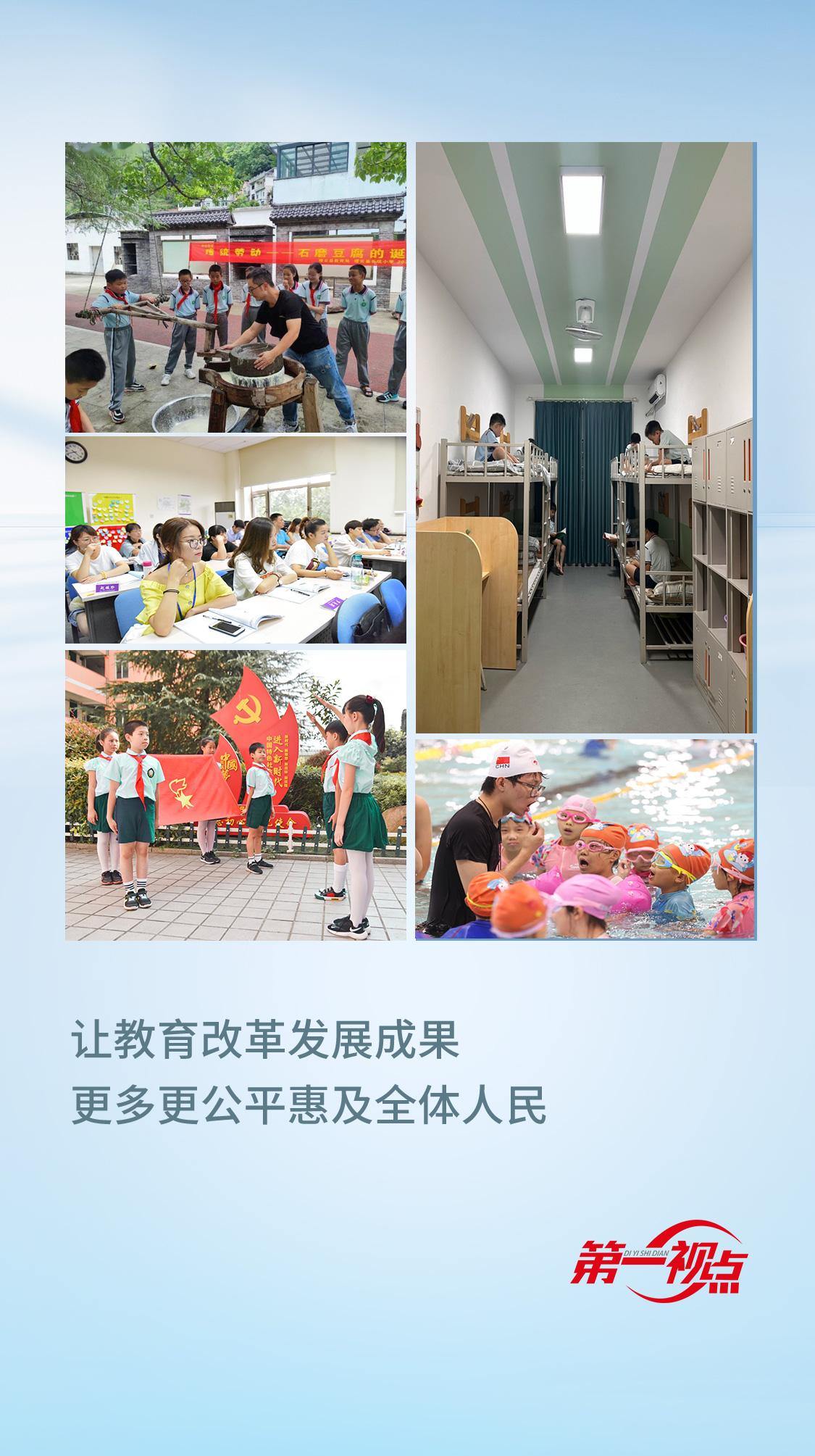
Education is the foundation of building a strong country and national rejuvenation. The National Education Conference held on September 9-10 blew a new horn for building an education power.
"We must persist in taking the people as the center, constantly improve the inclusiveness, accessibility and convenience of education public services, and make the achievements of education reform and development more fair and benefit all the people." General Secretary of the Supreme Leader emphasized at the meeting.
Looking back on the past, during his work in Zhejiang, the Supreme Leader attached great importance to education and promoted the implementation of "four projects" in rural primary and secondary schools, namely, the project of subsidizing students with financial difficulties, the project of caring nutritious meals, the project of reforming accommodation and improving teachers’ quality, so as to continuously improve the balanced development level of urban and rural education in Zhejiang.
Strengthen the teacher before teaching.
In the study of Zheng Zhihu, the former principal of Tiantai Middle School, the photo of the Supreme Leader with the third provincial meritorious teacher on September 8, 2004 was hung in the most eye-catching place.
那天出席全省庆祝我国第20个教师节暨表彰优秀教师大会的情景,现在还不时清晰地浮现在郑志湖的脑海中。
省功勋教师,是当时浙江给予教师的最高荣誉,每位功勋教师可享受省部级劳动模范和先进工作者待遇。
那一年的17位获奖者中,绝大多数是在中小学一线辛勤耕耘的老师,其中多位来自山区海岛的学校。
郑志湖,在天台这个山区小县是出了名的“铁人”。
每天早上6时他就出现在校园里,晚上11时以后办公室的灯才熄灭。他扑下身子抓教学质量,天台中学成为浙江高中物理教学一张闪亮的名片。
在这次大会上,最高领袖同志代表省委、省政府,向受表彰的教师和先进个人表示祝贺,向全省广大教职员工致以问候,也强调要努力为广大教师创造良好的工作生活环境,真心诚意办实事,切实帮助他们解决工作、学习和生活中的各种实际困难和问题。一席话,让郑志湖这名基层教育工作者心中暖洋洋的。
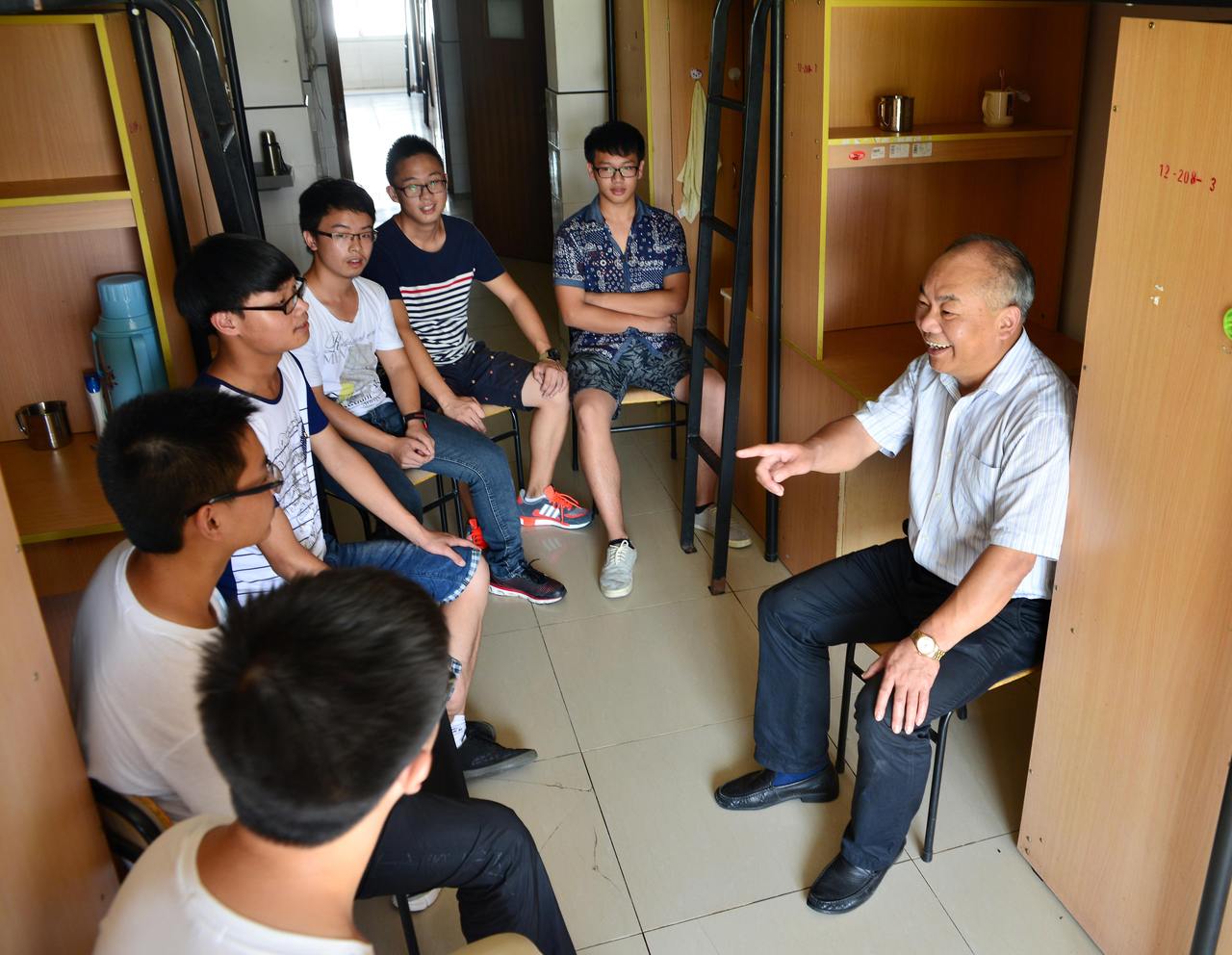
郑志湖在学生寝室与学生谈心(资料图片)
“郑校长,昨晚在电视上看见习书记和你们握手了,他跟你说了啥?”“还给劳模待遇,省里真重视教师啊。”……
On the second day after receiving the commendation and returning to Tiantai, Zheng Zhihu walked to school as usual in the morning. On the way of just a few tens of meters, several neighbors pulled him to congratulate him.
In 2017, when he reached retirement age, an educational institution offered him an annual salary of one million yuan. However, when Tiantai County leaders suggested that Tiantai Middle School could not do without him and asked him to postpone his retirement for five years, Zheng Zhihu agreed without saying anything.
“‘ Meritorious teacher ’ It is not only a medal for decades of teaching career, but also a responsibility that must be shouldered as a front-line teacher. " Zheng Zhihu is proud that he has not failed to live up to the expectations of the Supreme Leader General Secretary, and has always been steadfast in his dedication, making "Rise in the County" shine from the ideal into reality.
Strengthen the teacher before teaching. For rural primary and secondary schools, the improvement of education quality depends on the improvement of teachers’ quality first.
The pointer of time has been set back for 20 years. Lin Haohao, the principal of Sankui Town Central Primary School in Taishun County, is still a rural teacher who has tried his best but still cannot break through the professional bottleneck.
The project to improve the quality of rural primary and secondary school teachers promoted by the Supreme Leader in Zhejiang that year changed the growth track of many rural teachers like Lin Haohao, and then quietly changed rural education.
In 1995, Lin Shanghao, who just graduated from Pingyang Normal School, was assigned to the most remote rural school in Taishun, and he had to teach all subjects by himself. After working for six or seven years, he worked hard to participate in the lecture competition and voted for many papers, but he was always inferior to the teachers in the city.
"At that time, there were few training opportunities for teachers. I have only received a few on-campus trainings. The level of colleagues is similar, radish fried radish, not radish? "
Looking at Zhejiang at that time, the achievement rate of primary school teachers’ academic qualifications ranked lower in the country. Some primary school teachers have only a primary school diploma. Some teachers have to take time off to do farm work. When they walk into the classroom, their trouser legs are high and low, and there are mud spots on their legs that can’t be washed off.
In May, 2005, under the impetus of the Supreme Leader, the provincial finance allocated 20 million yuan as special funds, with famous teachers at the provincial and municipal levels as teachers, and began to carry out free training for 170,000 rural primary and secondary school teachers in the province from the summer vacation of that year.
In the absence of special teaching materials for training teachers, special-grade teachers in various disciplines and sections will compile them separately.
No one complained about the inconvenient transportation at the training site located in the county seat. No rural teacher wants to miss this once-in-a-lifetime opportunity, and he has to come to class on time after walking for an hour or two on the mountain road.
After three years of training courses, Lin Haohao found that he had made a breakthrough in improving his educational philosophy, the internal logic of classroom teaching and teaching design. Back in class, his state has changed completely. Since then, he has gradually grown into a senior Chinese teacher and a training object for Zhejiang famous teachers.
Zhejiang continues to implement the "Leading the Wild Goose Project" for rural primary and secondary school teachers, the training plan for Zhejiang famous teachers, principals and class teachers, and explores the "menu" and "order" training … … More and more "excellent forests" have emerged in rural primary and secondary schools, and the quality of rural education has continuously stepped onto a new level.
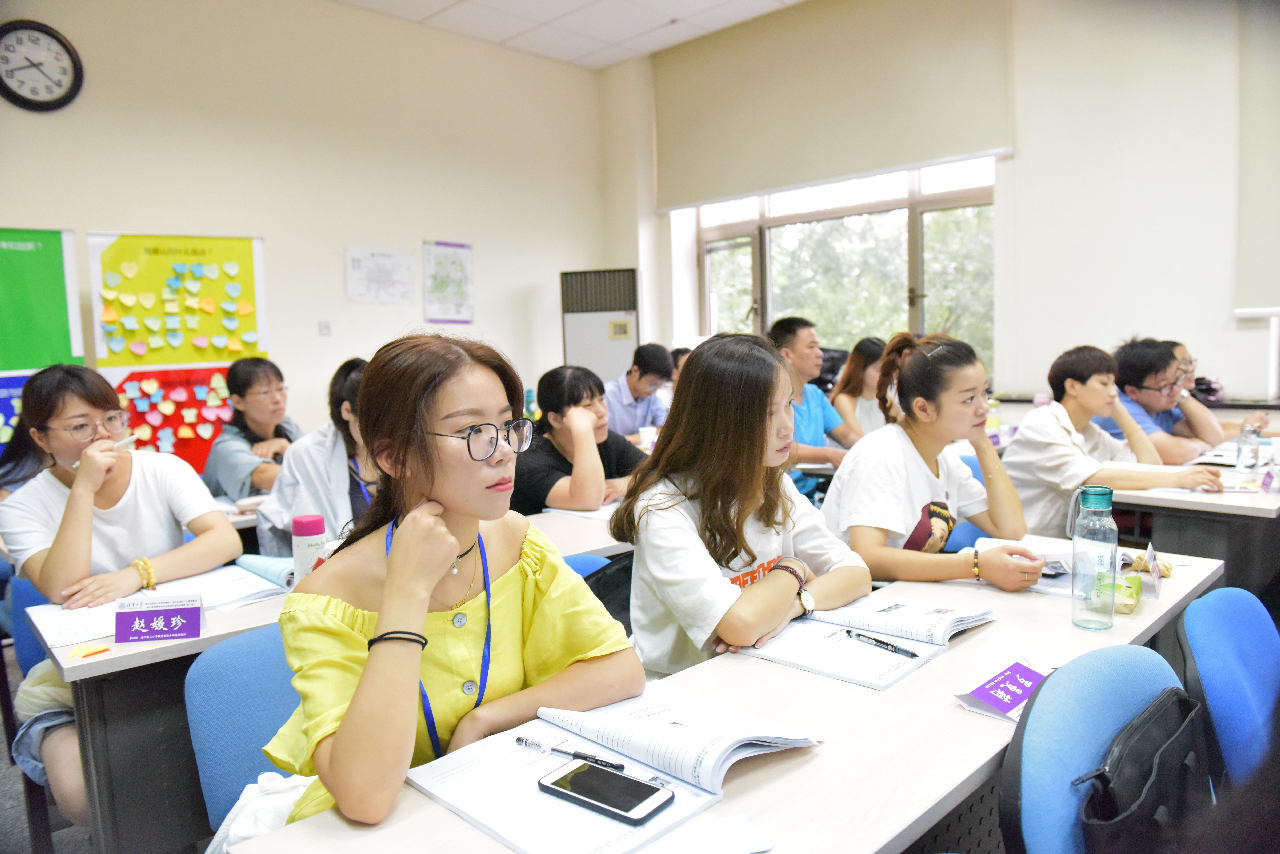
In August 2018, Pujiang Experimental Primary School Education Group and Puyang No.2 Primary School Education Group organized key teachers to study in Tsinghua University (data picture).
Let rural children read books and read good books.
At 8: 00 am on May 10th, 2005, I just arrived at work time.
Liu Yongwu, the headmaster of Changkeng Primary School in Dongdu, Jinyun County, was sitting in the office of the director of the county education bureau, waiting for a message.
"The first batch of accommodation renovation projects in the province has been decided, and the renovation of your school dormitory has been listed!" The director smiled and said, "How are you going to build … …”
Liu Yongwu rose abruptly from his chair and said as he walked out, "I’m going to make a plan now!"
Changkeng Primary School is a rural boarding school, but there has never been a dormitory. At that time, children in grades one to three slept in two rooms in an old ancestral hall.
There are more than 20 bunks in a room of more than 40 square meters, and 60 or 70 children have to sleep. Two first-grade children squeeze a bed 80 cm wide; Three second-grade children sleep in two bunks that are spliced together. Going to the toilet at night has to cross a pair of legs in the dark, which often wakes up most of the students in the dormitory. The so-called toilet is two wooden toilets in the corner.
The turning point appeared in 2003. In August and December of this year, the then supreme leader of Zhejiang Provincial Party Committee went to Lishui and Wenzhou to investigate the development of underdeveloped areas respectively. He not only went to the enterprise, went to Tiantou, but also visited the school. Many cadres and masses have reflected the problems that need to be solved urgently in rural basic education.
Comrade Supreme Leader gave clear instructions: "Let rural children read books and read good books."
After that, the Supreme Leader has repeatedly coordinated the provincial education department and other relevant departments to discuss together to provide better educational conditions for children in poverty-stricken areas.
In 2005, the construction of a strong education province was written into the document of the provincial party committee, which clearly put forward that the development of urban and rural education should be coordinated, rural education should be the top priority, the layout of rural education should be further optimized, the conditions for running schools in rural areas should be improved, and the level of running schools in rural areas should be improved.
In the same year, Zhejiang invested real money to start the "four projects" of rural primary and secondary schools.
September 1, 2006, this is a new semester written in the history of Changkeng Primary School. A brand-new white four-story building stands on the campus. The first floor is a canteen, and the other three floors are student dormitories.
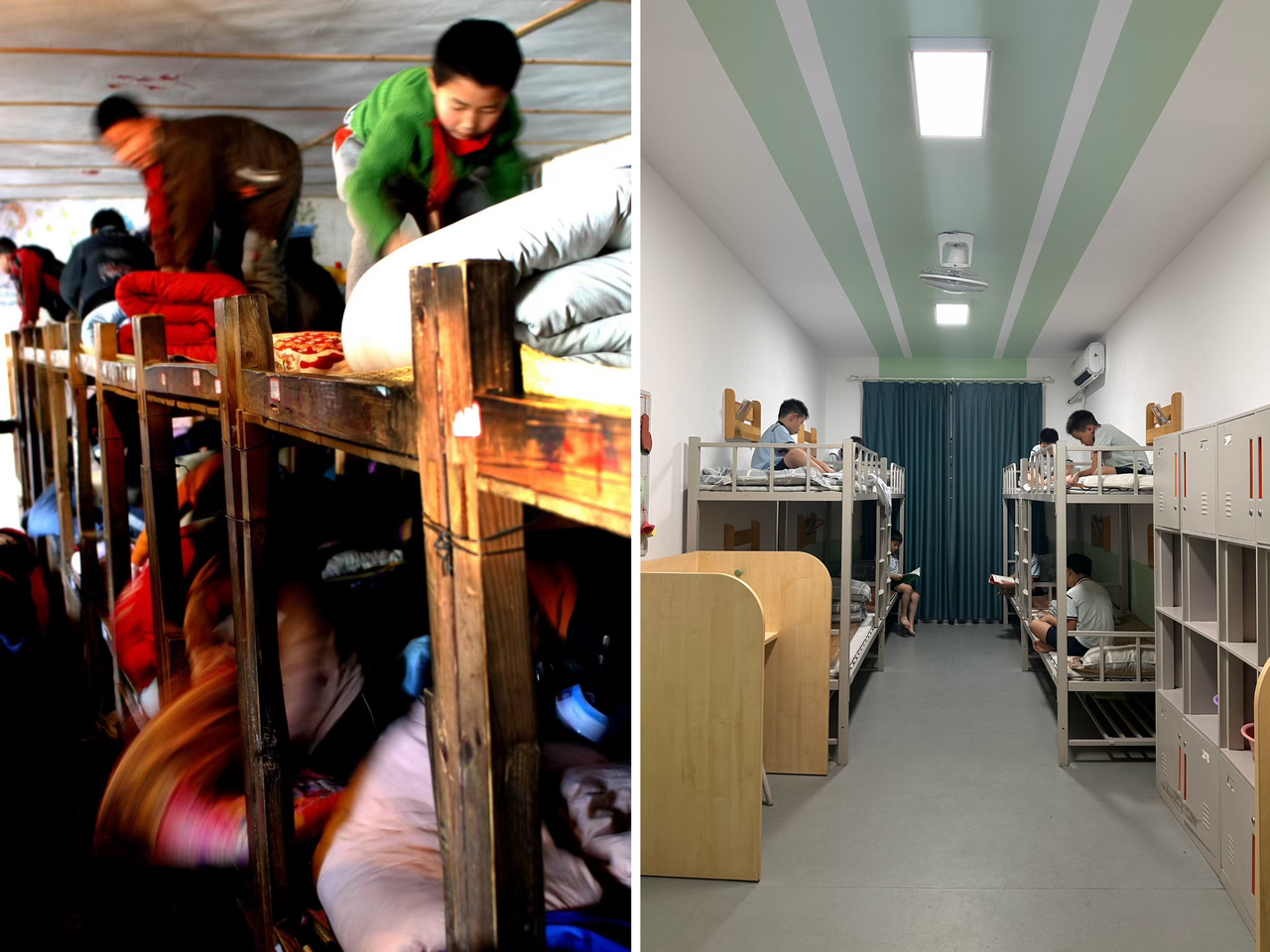
Photo courtesy of the student dormitory (left) before 2005 and the current student dormitory (right) of Changkeng Primary School in Dongdu, Jinyun County.
The children flew into the new dormitory and found one after another — —
"One bed for each person, no need to squeeze in!"
"Come and see, there is a toilet!"
……
In the second year, many parents in the surrounding counties and districts took their children to Changkeng Primary School to register. Liu Yongwu said that at the peak, half the children in the school came from other counties.
In 2007, on the basis of the "Four Projects", Zhejiang listed the efforts to start the construction of all the "Four Projects" accommodation renovation projects in rural primary and secondary schools, and 90% of the projects were completed as ten aspects of people’s livelihood.
这项政策改善了十余万名浙江农村中小学生寄宿条件,更带动社会各界群策群力,为提升农村教育条件添砖加瓦。
“近20年过去了,今天孩子们依然住在习书记关心下建起的宿舍楼里,内部设施已经更新了好几代。”刘勇武说,如今宿舍不仅有空调、储物柜,还开辟了图书角等园地。
“四项工程”中的家庭经济困难学生资助扩面工程,把农村困难家庭孩子的书本费、学杂费、代管费等费用全部免除。浙江是全国最早实行这项规定的。
爱心营养餐工程,让山里娃第一次尝到了牛奶的味道。20年间,一些山区县中小学生的平均身高增长了十几厘米。
……
同一片蓝天下
“嘉禾参加了学校的扎染社团和科学社团,可忙啦!”新学期开学,杭州市文渊小学五(6)班袁嘉禾妈妈和宁夏老家的长辈打电话,乐呵呵地讲起女儿的近况。
这家人扎根杭州已十多年,孩子在公办学校就读,与杭州户籍孩子享受完全同等的义务教育免费政策。两口子说,孩子入学了,才觉得真正在这里安家了。
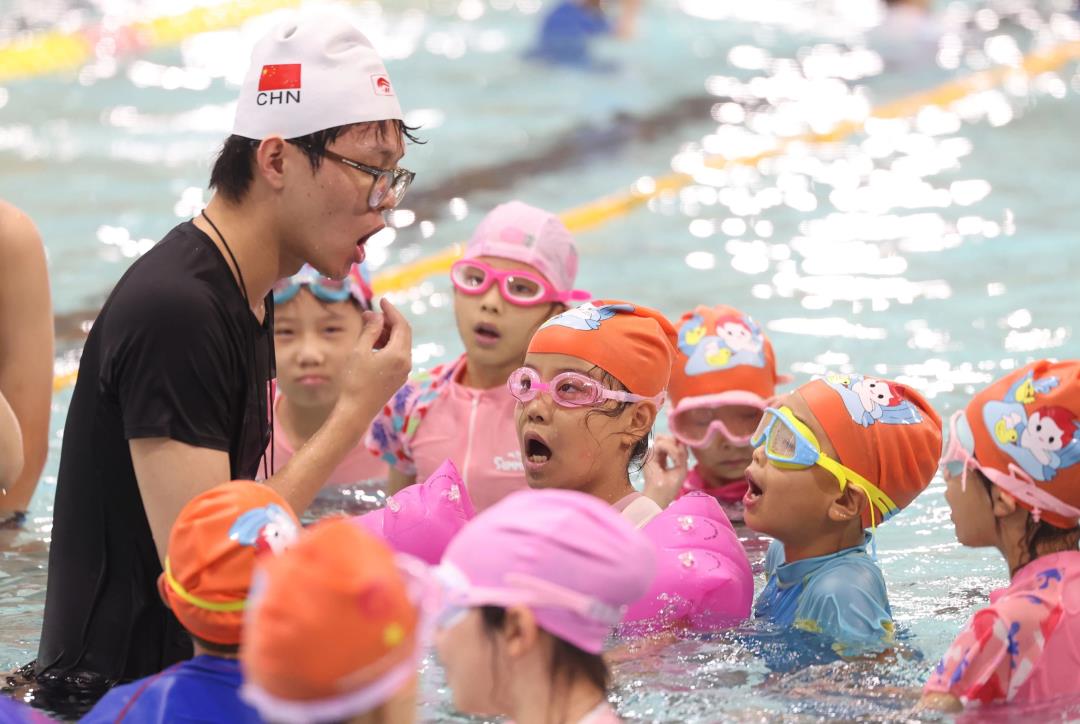
今年8月,杭州青少年活动中心与共青团杭州市滨江区委联合主办2024年“小候鸟”体育夏令营 杭州青少年活动中心供图
Time goes back to the beginning of the 21st century. With the acceleration of urbanization in Zhejiang, more and more children of migrant workers want to attend school in the city where their parents work, which brings a series of new topics.
Comrade Supreme Leader has a clear attitude towards this: create conditions for them to grow up healthily and happily together under the same blue sky.
For two consecutive years, the Supreme Leader and the children of migrant workers in Hangzhou celebrated Children’s Day on June 1st.
On May 31st, 2005, Hangzhou Youth Activity Center organized the children of migrant workers to participate in "Feeling Animation and Celebrating Together ‘ June 1st ’ " Activities. Some children do pottery, some learn animation in the computer room of "Little Doctor", and some operate small robots to find ore specimens in "space" … …
At this moment, a special guest came. The children shouted "Hello Uncle Xi" in unison.
During the exchange, the supreme leader comrade affirmed the children’s parents’ hard work for Hangzhou and wished the children healthy and happy growth in Hangzhou, the second hometown.
On the eve of Children’s Day on June 1st, 2006, the Supreme Leader came to Hangzhou Shuren Primary School to celebrate the festival with the children.
This is a school mainly for children of migrant workers. Jin Xiaolong, the then principal, remembers that at a parent-teacher meeting, a mother said with emotion: "When crossing the road, the children will tell us to watch the traffic lights and take the initiative to help wash the dishes after dinner. We are usually too busy to discipline our children, thanks to the school’s efforts in this regard. "
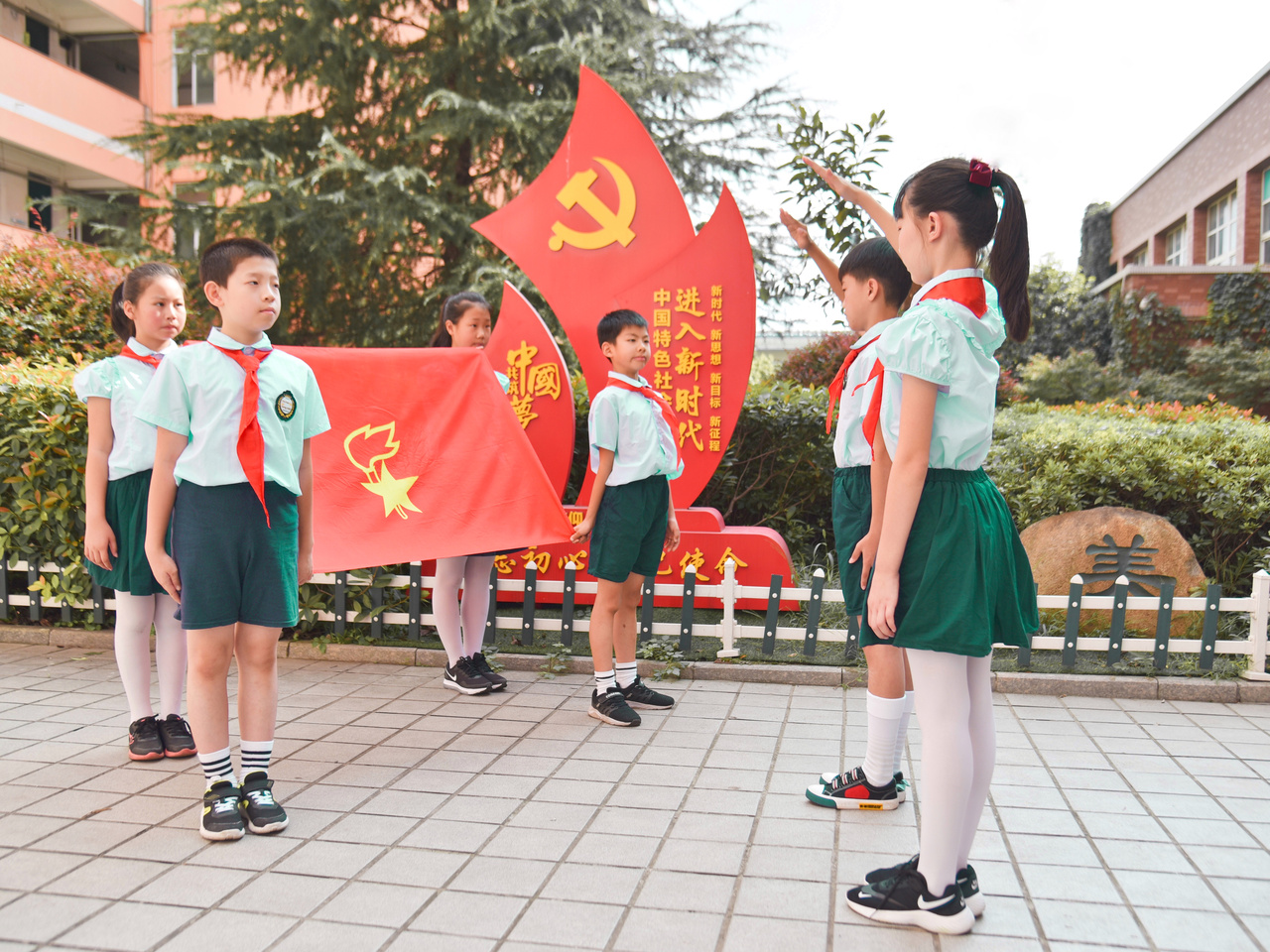
杭州树人小学如今的校园场景 学校供图
为了让外来务工人员子女更好融入城市生活,树人小学不仅教知识,还特别注重培养孩子们的行为习惯。学校里有一间“爱心小屋”,各界爱心人士捐助的文具、玩具琳琅满目,每件物品都被标上了分值。过马路走斑马线,见到老师同学要问好,帮爸爸妈妈做家务……这些日常习惯都能攒积分换礼物。
“习书记来学校时就参观了‘爱心小屋’,并细致询问如何获取爱心积分和奖励方法。”金小龙说,“习书记再三嘱咐我,不管是本地的还是外来的,要让孩子们共享优质教育的甘甜雨露。”
浙江省委、省政府把解决外来务工人员子女就学问题作为一项重大民生工程,持续推动。2006年,浙江将外来务工人员子女义务教育纳入政府教育事业发展规划;2009年,设立外来务工人员子女教育专项基金。
如今,符合条件的外省务工人员子女在浙江全面实现流入地升学。2023年,我省义务教育中小学随迁子女在校生达165.24万人,占全省义务教育段在校生的28.6%。